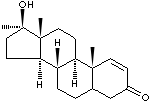PRODUCT IDENTIFICATION

H.S. CODE
TOXICITY
17beta-Hydroxy-17alpha-methyl-4-androsten-3-one; Metandren; 17a-methyl-delta 4-androsten-17b-ol-3-one; 17beta-Hydroxy-17alpha-methylandrost-4-en-3-one; 17beta-Hydroxy-17-methylandrost-4-en-3-one; 17-methyl testosterone; (17beta) 17-hydroxy-17-methyl androst-4-en-3-one;
CLASSIFICATION
PHYSICAL AND CHEMICAL PROPERTIES
practically insoluble
AUTOIGNITION
NFPA RATINGS
REFRACTIVE INDEX
Stable under ordinary conditions
APPLICATIONS
· Cloxotestosterone (CAS
RN: 53608-96-1)
· Ethisterone
(Ethynyl testosterone, CAS RN: 434-03-7)
· Mestanolone
(CAS RN: 521-11-9)
· 17alpha-Methyltestosterone (CAS RN: 58-18-4)
· Norethindrone
(CAS RN: 68-22-4)
· Normethisterone (CAS RN: 514-61-4)
· Oxymetholone
(CAS RN: 434-07-1)
· Silandrone (Testosterone trimethylsilyl ether,
CAS RN: 5055-42-5)
· Testosterone Acetate (CAS RN: 1045-69-8)
· Testosterone Phenylpropionate
(CAS RN: 1255-49-8)
· Testosterone Benzoate (CAS RN: 2088-71-3)
· Testosterone heptanoate
(CAS RN: 315-37-7)
· Testosterone phenylacetate (CAS RN: 5704-03-0)
· Testosterone propionate
(CAS RN: 57-85-2)
· Testosterone cypionate (CAS RN: 58-20-8)
· Testosterone ketolaurate
(CAS RN: 5874-98-6)
· Testosterone Undecanoate
· Testosterone
Glucuronide
· Testosterone Hemisuccinate
Alkylated testosterone at 17-alpha position such as methyltestosterone show more pharmacologic activity than testosterone itself. Methyltestosterone, a synthetic androgen, is used to treat testosterone deficiency in males. For females it is used in the relief of postpartum breast pain and swelling after pregnancy. It is used to treat the symptom of menopause and in the palliation of certain inoperable breast cancers. Methyltestosterone is a white to creamy white crystalline powder; melting point 162 - 167 C; practically insoluble in water; soluble in various organic solvents; administered orally or sublingually. The chemical designation is 17beta-hydroxy-17alpha-methyl-4-androsten-3-one.
APPEARANCE
ASSAY
OPTICAL ROTATION
MELTING POINT
162 - 167 C
LOSS ON DRYING
0.5% max
ANDROGENIC STEROIDS
Androgen |
CAS RN |
| 19-Norandrostenolone 17-cyclohexylpropionate | 912-57-2 |
| 5-Dihydro-19-nortestosterone | 1434-85-1 |
| Adrenosterone | 382-45-6 |
| Androstane-3,17-diol | 25126-76-5 |
| Androstenedione | 63-05-8 |
| Androsterone | 53-41-8 |
| Dehydroepiandrosterone acetate | 853-23-6 |
| Dehydroepiandrosterone sulfate | 651-48-9 |
| Desogestrel | 54024-22-5 |
| Dromostanolone | 58-19-5 |
| Dromostanolone propionate | 521-12-0 |
| Epiandrosterone | 481-29-8 |
| Fluoxymesterone | 76-43-7 |
| Gestrinone | 16320-04-0 |
| Mesabolone | 7483-09-2 |
| Mesterolone | 1424-00-6 |
| Methyltestosterone | 58-18-4 |
| Metribolone | 965-93-5 |
| Mibolerone | 3704-09-4 |
| Nandrolone cyclohexanecarboxylate | 18470-94-5 |
| Nandrolone furylpropionate | 7642-64-0 |
| Nandrolone acetate | 1425-10-1 |
| Nandrolone cyclotate | 22263-51-0 |
| Nandrolone decanoate | 360-70-3 |
| Nandrolone dodecanoate | 26490-31-3 |
| Nandrolone Phenpropionate | 62-90-8 |
| Nandrolone propionate | 7207-92-3 |
| Nandrolone undecanoate | 862-89-5 |
| Nisterime acetate | 51354-31-5 |
| Nisterime | 51354-32-6 |
| Norethandrolone | 52-78-8 |
| Norethindrone | 68-22-4 |
| Norgestimate | 35189-28-7 |
| Oxandrolone | 53-39-4 |
| Oxymetholone | 434-07-1 |
| Prasterone | 53-43-0 |
| Silandrone | 5055-42-5 |
| Sodium prasterone sulfate | 1099-87-2 |
| Stanolone | 521-18-6 |
| Stanozolol | 10418-03-8 |
| Testosterone cypionate | 58-20-8 |
| Testosterone enanthate | 315-37-7 |
| Testosterone ketolaurate | 5874-98-6 |
| Testosterone phenylacetate | 5704-03-0 |
| Testosterone propionate | 57-85-2 |
| Testosterone | 58-22-0 |
| Tibolone | 5630-53-5 |
| Trestolone acetate | 6157-87-5 |